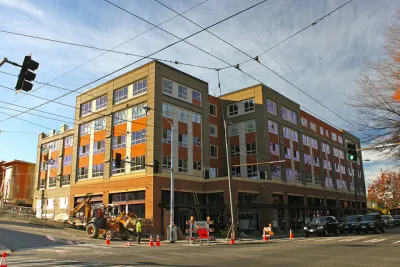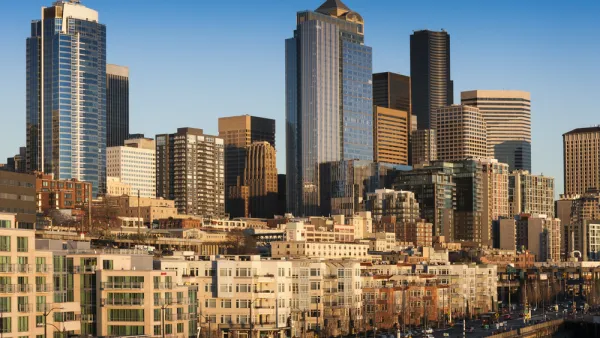Not just any apartments, only those served by frequent transit. Developers will still have a "mobility" requirement: In lieu of a parking space, they'll need to provide tenants with transit passes and memberships in car and bikeshare services.

"City officials say the idea of promoting ways to build apartments without parking is to make room for the denser development needed to accommodate the expected 120,000 new residents of Seattle in the next twenty years," reports Graham Johnson of KIRO 7.
In its presentation [PDF] on "Parking Requirements Near Transit" to the city's Planning, Land Use and Sustainability Committee on May 5, "the Department of Planning and Development [DPD] outlined a recommendation to require developers of new projects in neighborhoods with good transit to provide residents with a pass and membership in a car and bike sharing services," writes Johnson.
Density is but one of the objectives. The strategy can mitigate traffic congestion:
"We don't have enough roadway space for all of the vehicles if everyone was going to be expected to drive a car," said Bryan Stevens of DPD.
Affordability is also a key objective, particularly when tied to building micro-apartments, a housing type where Seattle is king. "At last count, 782 micro-housing units were cleared for occupancy in Seattle, with another 1,598 units in the pipeline," wrote Susan Kelleher for The Seattle Times on March 4. "No other American city comes close."
Housing without parking already exist for "about 2,400 units" according to Johnson, although he doesn't describe the housing types.
In February, Linda Byron of KING 5 News reported that "when it comes to parking, the housing boom is threatening to make free street parking a scarcer commodity in some areas, thanks to city policies that let developers off the hook when it comes to building parking spots in new apartment and condo complexes."
Bryon notes that the "parking-free" ordinance is not new—it goes back five years for housing served by frequent transit located in the two areas described below by DPD:
Urban Centers and Villages
Urban Centers and Villages are areas designated in Seattle's Comprehensive Plan to accommodate future population and job growth. These areas were adopted as part of the 1994 Comprehensive Plan to help guide land use and transportation policies.
Hat tip: Len Conly, Sierra Club Green Transportation.
FULL STORY: New apartments could offer transit passes instead of parking

Analysis: Cybertruck Fatality Rate Far Exceeds That of Ford Pinto
The Tesla Cybertruck was recalled seven times last year.

National Parks Layoffs Will Cause Communities to Lose Billions
Thousands of essential park workers were laid off this week, just before the busy spring break season.

Retro-silient?: America’s First “Eco-burb,” The Woodlands Turns 50
A master-planned community north of Houston offers lessons on green infrastructure and resilient design, but falls short of its founder’s lofty affordability and walkability goals.

Test News Post 1
This is a summary

Analysis: Cybertruck Fatality Rate Far Exceeds That of Ford Pinto
The Tesla Cybertruck was recalled seven times last year.

Test News Headline 46
Test for the image on the front page.
Urban Design for Planners 1: Software Tools
This six-course series explores essential urban design concepts using open source software and equips planners with the tools they need to participate fully in the urban design process.
Planning for Universal Design
Learn the tools for implementing Universal Design in planning regulations.
EMC Planning Group, Inc.
Planetizen
Planetizen
Mpact (formerly Rail~Volution)
Great Falls Development Authority, Inc.
HUDs Office of Policy Development and Research
NYU Wagner Graduate School of Public Service



























